"“The best part of teaching is having the opportunity to work with students…to hear their ideas and to see their enthusiasm.”
Registered Nurse, Medical Geneticist, Professor, Dean
Professional Career:
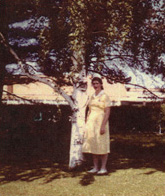 After receiving her bachelor’s degree in nursing from Adelphi, Felissa Lashley went on to pursue her master’s degree in medical-surgical nursing and education from New York University. Upon moving to Illinois in 1965, Dr. Lashley obtained her Ph.D. in genetics from Illinois State University and embarked on a distinguished career as an educator and leader in the field of nursing and genetics.
After receiving her bachelor’s degree in nursing from Adelphi, Felissa Lashley went on to pursue her master’s degree in medical-surgical nursing and education from New York University. Upon moving to Illinois in 1965, Dr. Lashley obtained her Ph.D. in genetics from Illinois State University and embarked on a distinguished career as an educator and leader in the field of nursing and genetics.
Dr. Lashley was recruited by the University of Illinois to start a master’s program in the College of Nursing at the Peoria campus and to teach genetics in their College of Medicine. During her 23 years at the University, her most memorable experience occurred during a botulism outbreak in the early 1980s. “It was an absolutely fascinating experience,” says Dr. Lashley, who put together a team, secured federal grant support, and studied people with the illness.
Along with a colleague, who she is proud to say was also a nurse, Dr. Lashley created a publication for patients and families who are affected by botulism, which is still used today by Centers for Disease Control and Prevention (CDC). Dr. Lashley cites this experience as one of her proudest professional accomplishments: “That project really made a difference in people’s lives.”
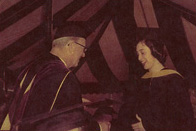 In 1995, Dr. Lashley’s experience as a nursing educator was sought by Southern Illinois University. She was recruited as dean and professor of the University’s School of Nursing, and as a clinical professor of pediatrics at the University’s School of Medicine.
In 1995, Dr. Lashley’s experience as a nursing educator was sought by Southern Illinois University. She was recruited as dean and professor of the University’s School of Nursing, and as a clinical professor of pediatrics at the University’s School of Medicine.
“The best part of teaching is having the opportunity to work with students…to hear their ideas and to see their enthusiasm,” says Dr. Lashley.
After serving as dean and professor at Southern Illinois University for seven years, Dr. Lashley was named dean of the College of Nursing at Rutgers University in 2002. Under her leadership, Rutgers’ College of Nursing initiated new graduate programs and established the Nursing Center for Emerging Infectious Diseases and Bioterrorism Preparedness. The College increased the diversity of faculty and administration, and experienced significant growth in undergraduate and graduate enrollments as well.
In addition to her wealth of knowledge and experience in nursing, Dr. Lashley is also an expert in the field of genetics. She holds a Ph.D. in human genetics from Illinois State University as well as a certificate in medical genetics from Jackson Laboratories. Dr. Lashley began providing clinical genetics services and genetic counseling in 1973. She was the first nurse to be certified as a Ph.D. Medical Geneticist by the American Board of Medical Genetics, and was a founding fellow of the American College of Medical Genetics.
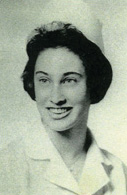 “I always felt I brought something extra to this field with my nursing background,” says Dr. Lashley, who considers assisting in the translation of genetic knowledge to the clinical practice of nursing to be one of her greatest professional achievements.
“I always felt I brought something extra to this field with my nursing background,” says Dr. Lashley, who considers assisting in the translation of genetic knowledge to the clinical practice of nursing to be one of her greatest professional achievements.
Throughout her career, Dr. Lashley has belonged to professional organizations including the American Nursing Association, American College of Medical Genetics, Association of Nurses in AIDS Care (ANAC), Midwest Nursing Research Society, National League for Nursing, American Academy of Nursing, International Society of Nurses in Genetics, and the American Society of Human Genetics. She is a fellow of the American Academy of Nursing, and served as president of the HIV/AIDS Nursing Certification Board.
Dr. Lashley is widely published on the topics of genetics, infectious disease, and HIV/AIDS. She has received numerous awards throughout her career, including the Nurse Practitioner’s Book of the Year Award, American Journal of Nursing’s Book of the Year Awards, the Golden Lamp Award for excellence in teaching at the University of Illinois’ College of Nursing, the Exxon Educational Foundation Innovation Award, the Research Recognition Award for Outstanding Research from ANAC, the all-University Distinguished Alumni Award from Illinois State University, and the SAGE Award for mentoring nurse leaders. She served as a member of the National Institutes of Health Consensus Development Panel for Phenylketonuria Screening and Treatment.
“I’ve had a wonderful career,” says Dr. Lashley, who retired in 2008. “I’ve enjoyed it so much.” Today Dr. Lashley is an active consultant and continues her writing; she is currently working on two books. In her free time, she enjoys spending time with children, grandchildren and friends, as well as traveling.
When and why did you first want to become a nurse?
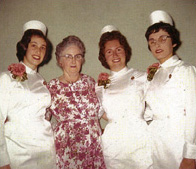 Growing up in the Bronx, I went to James Monroe High School. Even in first grade, I always wanted to be a nurse, and never wavered from that goal. At the time, the careers for women were librarians, teachers, secretaries, or nurses. My pediatrician was very close with my family, and he told me that if I was going to pursue nursing, I should get my baccalaureate degree, not just a nursing diploma from a hospital school. He was the one that introduced me to Adelphi, informing me that it was a good school with a good nursing program. While my parents encouraged me in pursuing a degree, I was basically on my own to pay tuition. Luckily, I received a competitive New York State Regents Scholarship and Adelphi provided me with a matching scholarship, and I was able to enroll.
Growing up in the Bronx, I went to James Monroe High School. Even in first grade, I always wanted to be a nurse, and never wavered from that goal. At the time, the careers for women were librarians, teachers, secretaries, or nurses. My pediatrician was very close with my family, and he told me that if I was going to pursue nursing, I should get my baccalaureate degree, not just a nursing diploma from a hospital school. He was the one that introduced me to Adelphi, informing me that it was a good school with a good nursing program. While my parents encouraged me in pursuing a degree, I was basically on my own to pay tuition. Luckily, I received a competitive New York State Regents Scholarship and Adelphi provided me with a matching scholarship, and I was able to enroll.
Do you have favorite memories of your time at Adelphi and your residencies?
One of my first memories from Adelphi was going to a “Welcome Bon Fire” in September. It was really nice because it gave us the opportunity to meet a lot of people early in the year.
We had wonderful clinical instructors and really learned nursing. The teachers that I remember most fondly from Adelphi are: Ruth Witted, Justina Eisenhauer, Joan Suyker, Ella Rothermel, Juanita Wilson, Eleanor D’Alessi, Donald Koster (English) and Marie Conklin (biology).
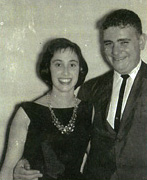 I remember a course in which we would visit different neighborhoods – Italian, Jewish, Greek, African-American, Puerto Rican – in New York City. We would attend religious ceremonies, go to lunch, and talk to leaders from each community. It was a wonderful experience. One of the clearest memories from that experience was visiting Abyssinian Baptist church in Harlem where Adam Clayton Powell was the pastor.
I remember a course in which we would visit different neighborhoods – Italian, Jewish, Greek, African-American, Puerto Rican – in New York City. We would attend religious ceremonies, go to lunch, and talk to leaders from each community. It was a wonderful experience. One of the clearest memories from that experience was visiting Abyssinian Baptist church in Harlem where Adam Clayton Powell was the pastor.
My senior year I needed an elective, but I didn’t have too many options because my nursing courses filled up much of my schedule. A genetics course was available, and I thought that it would be interesting; however, it turned out that I did not have the pre-requisites to take the course. I was able to convince Dr. Conklin to let me take it. I never would have thought 12 years later I would earn my Ph.D. in it!
Margaret Shay was the dean of Adelphi when I was there; she left to become dean of Southern Illinois University, which is where I later became dean. Life is full of coincidences.
Adelphi helped me learn that you really can do whatever it is you want to do. Being at Adelphi broadened my viewpoint of the world. I learned to think differently. The patients we worked with in our clinical experiences and the teachers we had were wonderful.
What advice would you give to today’s nursing students?
Never let anyone tell you that you can’t do something. I got where I am today because I pursued what I wanted. If you want it, keep at it and don’t get discouraged. You can do whatever you set your mind to. Life is a grand adventure. Embrace it.
For further information, please contact:
Todd Wilson
Strategic Communications Director
p – 516.237.8634
e – twilson@adelphi.edu